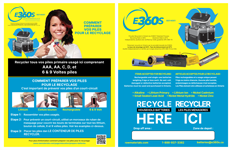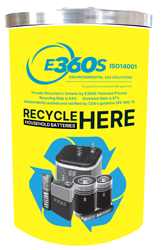
Recycling at work is so important. In fact, the Industrial, Commercial, and Institutional (IC&I) sector sends more waste to landfill than the residential sector.
In light of that, more and more companies are striving for zero waste, which is to recycle and reuse all waste. It may seem unobtainable at first, but it's not impossible. It really depends on what services there are in your community, and how people at your company respond. The truth is most people want to do the right thing when it comes to waste. Manufacturing by-products aside, there are ways to recycle most things including:
- Food waste (organics)
- Paper products
- Plastic and metal containers
- Glass
As for by-products, you can scour marketplaces that are looking for the materials that you're throwing away. In fact, you may even be able to sell them.
Not only do these companies realize the financial benefits of zero waste to landfill, which can be quite significant. There is also a boost to the brand's reputation for its good social responsibility.
How to Recycle Batteries at Work
Batteries are another item that many companies use every day that should be recycled. Businesses can setup collection containers to recycle batteries from their operations, and even to provide a convenient option for their employees.
Take an Inventory
The first thing you should do is take an inventory of the types of batteries you're using at your work. Do you accumulate the typical single-use and rechargeable batteries that you use at home? Perhaps you use battery operated power tools, or forklift batteries. Take stock of all the batteries you use and get an approximate idea for how many you would use in a year.
Once you have a good idea about the types of batteries you're using, reach out to a service provider.
Environmental 360 Solutions Ltd.
We recycle a variety of hard to manage wastes for the IC&I sector, including all battery types. Once we understand what types of batteries you have and the approximate volume, we'll send you some containers to recycle them all. You'll recycle household batteries in pails or drums, and if you have the larger format batteries, they can be placed on a pallet.
Where to Put Your Recycling Containers
The best advice would be to put your recycling containers in places where people will notice them. Any pallets or drums will have to remain on the ground level in a secure weather protected area so that they can be picked up by the service provider.
Promoting your Recycling Program
Once you have your recycling containers set up, you'll want to promote the program so that everyone knows how it works. You'll want to tell people what types of batteries can be recycled, and which batteries need to be taped prior to depositing them in the collection container.
Some of the best ways to promote a recycling program at work are:
- Posters - hang them in high traffic areas
- Screensaver reminders
- PA announcement reminders
- Reminders sent along with pay stubs
- Social media posts
- Newsletters

Download one of our posters
Safety
Batteries are extremely useful, and they power many of the tools we use to do our jobs everyday. Yet, if you're currently throwing batteries in the garbage, you risk damage to your property and the health and safety of your employees.
To reduce the risk of fire from improper battery disposal, provide a convenient and accessible option for staff to recycle them. It's that simple. Educate your staff so they know which batteries need to have the terminals taped. This information is very useful not only at work, but also for their personal lives at home.




Scheduled or On Call Pickup
We offer convenient pickup options for all our customers. Depending on the types of batteries you use and the amount, customers can be placed on a reoccurring schedule or can call as needed.
Reporting
We keep track of all the batteries sent to us for recycling. We issue certificates of recycling for all waste shipments within 90 days. This information can be used to substantiate a case for an environmental accreditation you're striving for, or to simply share with your employees to provide feedback on their efforts.
Other Wastes
Our company is also permitted to collect, store and transport other hard to manage wastes including:
- Lead bearing wastes
- Mercury bearing wastes
- Fluorescent tubes, bulbs and lamps
- Electronics
- Garbage, cardboard and organics
- Special wastes
- Bin rentals
At the end of the day, recycling is not only great for the environment, but it can be good for your bottom line too.
Thank You
We have received your message and we will respond to you shortly.
Contact Us
Please use the form below to contact us today!
Sorry, there were error(s) with your submission.
Please try again.
Contact Us
Please use the form to the left, or contact us today at:
Toll Free: (888) 937-3382
Fax: (905) 835-6824
Environmental 360 Solutions Ltd.
17 Invertose Drive
Port Colborne, ON L3K 5V5
Canada
We will put you in touch with a representative that will be able to answer all of your questions.
Thank you!
Quick Links
For your convenience, here is a summary of important links related to this page.
- Battery Types
- Lead Acid Battery
- Primary Battery
- Rechargeable Battery
- Vented Cell Battery
- Battery Recycling Containers
- Promotional Materials
- Waste Management
- Additional Services
- How to Prepare Your Batteries for Recycling
Did you know?
Zinc is one of the world's most commonly used metals. Approximately 30% of the zinc today comes from recycled sources. Environmental 360 Solutions is able to recover zinc from the batteries that you recycle. The zinc we recover is then reused as micronutrients in fertilizer to grow corn for biofuel.
As a result of E360S's recycled materials, farmers are able to increase their yields by over 20 bushels per acre. This is important considering our growing population and the need to make efficient use of our existing farmland.
Find out more about our technology and how together we are turning waste into a valuable resource.
